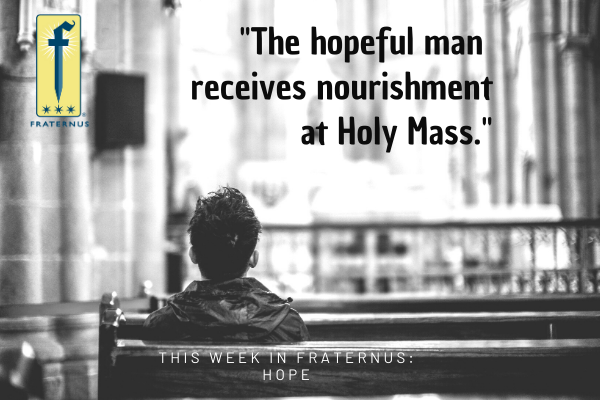The Hopeful Man Receives Nourishment at Holy Mass

Don't just go to mass - assist
- by Craig Taffaro
One may hear of the need to prepare for Holy Communion, but wonder how. Besides the obvious — be in a state of grace — or the many beautiful prayers written to help prepare a soul for Communion, one should study the Mass. Holy Mass contains within it the means for proper preparation and efficacious reception of its end, the Eucharist. The faithful are encouraged to assist — not merely attend — Mass that they may prepare well for Communion and offer fitting thanksgiving. A look at Mass parts reveals the great wisdom of Holy Mother Church and the love of God who became man so that He could offer His body as food.
The Mass can be divided into parts that each encourage different movements in the soul: from the Entrance Antiphon to the Collect, contrition; from the Collect to the Profession of Faith, faith; in the Eucharistic Prayer, hope; at Communion, love; from the Communion Antiphon through the prayer after Communion, gratitude. (Or, for traditional Latin Mass goers: Introit to the Collects, contrition; Collects to Credo, faith; in the Canon, hope; at Communion, love; ablutions to the end, gratitude.) These are not strict boundaries, but suggestions to help one more actively participate, or assist, at Holy Mass and to receive the Eucharist with great effect. The hopeful man, for example, should receive nourishment in both the Liturgy of the Word and the Liturgy of the Eucharist.
If one is to receive nourishment through Mass, he must be attentive and intentional, not a passive observer. Mass attendance is not a spectator sport. The point in drawing attention to the parts of the Mass above and corresponding spiritual movements is to highlight the fact that the Mass is not haphazard — it is carefully constructed to prepare one for communion with his Creator. A man need not be advanced in learning to receive nourishment from the Eucharist, but he should learn the Mass that he may more fully enter into the mystery of faith.
From Chapter 35 of St. Theresa of Avilla’s work The Way of Perfection:
If at first you do not get on with this practice [of being prepared to receive nourishment at Mass] (which may happen, for the devil will try to oppress and distress your heart, knowing what great harm he can do in this way), the devil will make you think that you can find more devotion in other things and less in this. But [trust me and] do not give up this method, for the Lord will use it to prove your love for Him. Remember that there are few souls who stay with Him and follow Him in His trials; let us endure something for Him and His Majesty will repay us. Remember, too, that there are actually people who not only have no wish to be with Him but who insult Him and with great irreverence drive Him away from their homes. We must endure something, therefore, to show Him that we have the desire to see Him. In many places He is neglected and ill-treated, but He suffers everything, and will continue to do so, if He finds but one single soul which will receive Him and love to have Him as its Guest. Let this soul be yours, then, for, if there were none, the Eternal Father would rightly refuse to allow Him to remain with us. Yet the Lord is so good a Friend to those who are His friends, and so good a Master to those who are His servants, that, when He knows it to be the will of His Beloved Son, He will not hinder Him in so excellent a work, in which His Son so fully reveals the love which He has for His Father, as this wonderful way which He seeks of showing how much He loves us and of helping us to bear our trials.
Catechism 1324: The Eucharist is “the source and summit of the Christian life.” “The other sacraments, and indeed all ecclesiastical ministries and works of the apostolate, are bound up with the Eucharist and are oriented toward it. For in the blessed Eucharist is contained the whole spiritual good of the Church, namely Christ himself, our Pasch.”
Share This Post


